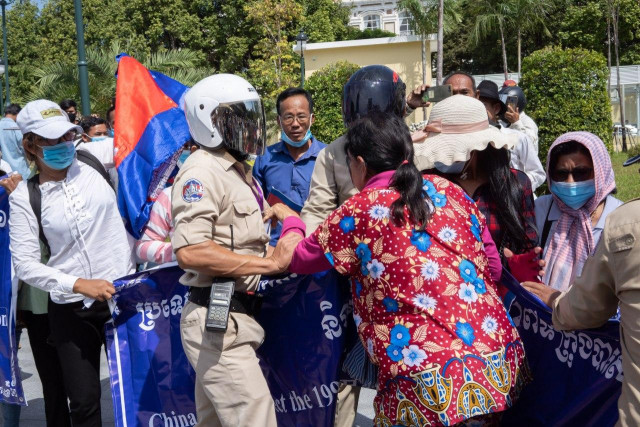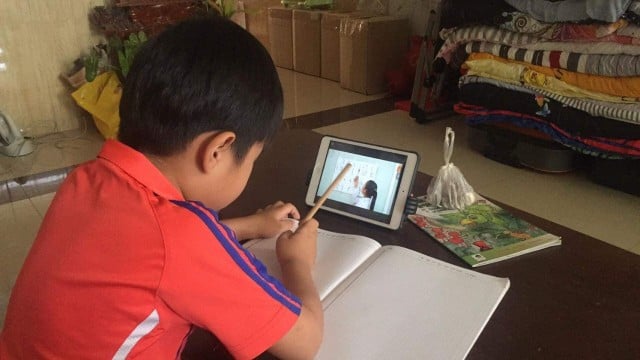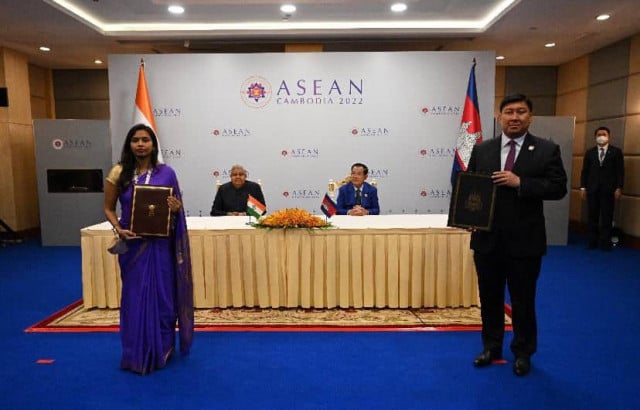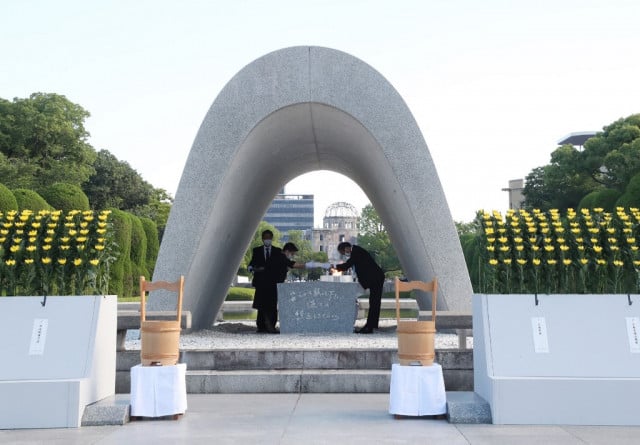Police Brutality as Peaceful Protesters Commemorate Paris Peace Agreement

- Gerald Flynn and Phoung Vantha
- October 23, 2020 1:05 PM
Peaceful assembly across Phnom Penh was met with a violent response from police, as protesters requested the government respect the core tenets of the Paris Peace Agreement on the 29th anniversary of its signing.
PHNOM PENH--Hiding their identity by wearing motorbike helmets, scores of olive and beige clad policemen on Oct. 23 violently suppressed a number of demonstrations in Phnom Penh as protesters sought to celebrate the 29th anniversary of the Paris Peace Agreement.
Protesters defied Prime Minister Hun Sen who, on Oct. 21, warned Cambodians against causing trouble. They were met with a large police presence and a blockade on Mao Tse Toung Boulevard. The road had been blocked to prevent protesters from reaching the Chinese Embassy in Phnom Penh, where protesters had stated they intended to deliver a petition.
The petition was scheduled to be delivered to the Chinese Embassy, and then to the US Embassy and the French Embassy respectively, but violent scenes erupted on Mao Tse Toung Boulevard as heavy-handed police dragged screaming protesters through the street and loaded them into a police van.
Three people were arrested and neither the protesters nor their petition made it to the Chinese Embassy. At press time the embassy had made no official statement about the incident.
“We got here at 8 a.m. and there were quite a lot of us, but there were so many police,” recalled one woman who was sitting on the pavement further up Mao Tse Toung Boulevard while other protesters tended to her injured leg.“The police were the ones who hurt me previously, but they pushed me over again today—even though they can see that my leg is still injured from last time,” she said, adding that she and other protesters had previously experienced violence during a protest.

After being helped to her feet, she went to join the other protesters who assembled at the US Embassy around 9.45 a.m. and were joined by the wives of former opposition-party members now in jail who had been protesting outside the Phnom Penh Municipal Court earlier in the day.
UN observers who had been present at the municipal court that morning confirmed that similarly violent tactics had been employed by the police, as they have been numerous times over the course of this year.
Roughly 70 protesters were gathered outside of the US Embassy, waving the flags of both Cambodia and the UN, but police quickly swarmed around the group and demanded to know why they were protesting. Initially the exchange between protesters and police was civil, almost cordial, as protesters explained that they were here to deliver a petition to request an intervention from the US.
Peaceful Petitioning of Paris Peace Agreement Signatory States
The petition was a call for all signatories to the Paris Peace Agreement to hold the Cambodian government to account in implementing it. Protesters demanded that China respect Cambodia’s sovereignty in relation to the recent rumors over an alleged Chinese naval base being developed on Cambodia’s coast, saying they remain unconvinced by Hun Sen repeated denials of such a base.
The rumors continued to swirl following the revelation that a recently-built naval facility that had been constructed by the US for the use of the Cambodian Navy had been demolished, with analysts in Washington D.C. arguing that this was to make room for China’s own military installation.
The civility between police and protesters broke down when the group, mostly consisting of women, unfurled banners that urged both the Cambodian and Chinese governments to respect the rights granted by the Paris Peace Agreement. At the sight of banners, the police descended on the crowd, with one woman who was clinging to her banner being dragged along the road by police.
Plainclothes police officers were seen laughing on the sidelines as the woman cried in pain and police wearing motorbike helmets grabbed, shoved and shouted at the protesters. Still, the morale of the protesters held strong and, after tending to the injured, they reformed their line and attempted to chant through a megaphone.
Protesters barely finished one sentence—“Peace does not belong to one person”—before the police violently confiscated the megaphone, pushing one woman to the ground in the process while another was dragged down the street in a headlock.
“I just came here because I heard that people were gathering and I wanted to join,” said one woman who had been placed in a headlock and wished to remain anonymous. She had traveled from Banteay Meanchey Province to celebrate the Paris Peace Agreement and was shocked by the level of violence displayed by the authorities.
“I saw my people calling on the government to respect our human rights and so I had to join, we want freedom for our people—right now a lot of things are going wrong,” she said.
She complained that the flooding in Banteay Meanchey Province had been poorly handled by the government, where she said residents were receiving just a few kilograms of rice when they have lost their homes, livelihoods and in some cases family members.
“The government needs to rethink its actions,” she said. “They’re doing wrong by their own people, arresting people for no reason. And yet, they got all those donations for COVID-19 and the flooding, but where is it? How much money does Hun Sen have here and outside the country? How many multimillion dollar houses does he have? What about us? We have no homes now the floods have taken them.”
Around 11 a.m. police again blocked the protesters from attempting to walk to their next destination, the French Embassy. After a 30-minute standoff, where protesters chanted defiantly in front of a line of helmet-wearing police, the protesters eventually left the US Embassy in tuk-tuks.
Chad Roedemeier, spokesperson for the US Embassy, confirmed that the embassy had received a petition on Oct. 23 and reiterated that Cambodians have the right to freedom of expression and assembly as guaranteed by the country’s constitution.
“We have consistently raised democracy and human rights concerns with the Cambodian government, and urged the government to take meaningful steps to reopen the political and civic space,” Roedemeier said in an email.
“We do not support any particular political group or individual,” he added. “We support the Cambodian people, and their constitutional right to democracy and fundamental freedoms.”
Protesting for the Future of Cambodia
The violence that had defined the morning dissipated by the time the protesters arrived at the French Embassy, but the police maintained a heavy presence, easily outnumbering the protesters in a display of force.
Protesters were able to submit their petition to the French Embassy and, according to one representative of the protesters who entered the embassy, the French were “not indifferent” to the concerns of the protesters.
One woman, a Phnom Penh resident who had joined the protest as a way to celebrate the anniversary of the Paris Peace Agreement, said that she felt compelled to do something.
“The government needs to let us use our rights, we should have freedom of expression,” she said. “But the authorities don’t care about us, my community has seen no support during the flooding, there was none when COVID-19 began and I live alone since my son died, the government should look after people like me.”
She went on to explain that her son had been involved in protests in 2013. Police had struck him with a taser, electrocuting him until he was unconscious. The woman said that her family couldn’t afford to send her son to a good hospital and that he never really recovered.
“He was always getting sick after that, he was only 27 when he died—he was young, he was single,” she said. “So even though we’re living day to day and we are poor, I had to come here today to make sure the future is better.”
“I don’t feel safe here, but I’m not afraid—I’ve seen many people injured today,” she said. “The police used to protect people. But today things are very different, they don’t learn about ethics or the rule of law.”
Meanwhile, in celebration of the 29th anniversary of the signing of the Paris Peace Agreement Justice Ministry Spokesperson Chin Malin took to Facebook to declare the Paris Peace Agreement null and void, saying that the government has no duty to respect the agreement now that it has its own constitution.
“If we don’t have the Paris Peace Agreement, then Cambodia would never have had democracy, human rights or the developments supported by the international community,” said Seong Senkaruna, a senior investigator with the human rights group ADHOC. “The Paris Peace Agreement is still very, very useful—it brought an end to Cambodia’s civil war.”
Responding to Malin’s notion that the Cambodian Constitution has invalidated the Paris Peace Agreement, Senkaruna questioned the practical implementation of the rights enshrined in the Constitution.
“Is there respect for human rights? Do we follow the rules of the democratic systems? How about elections? Are they free and fair?” he said.
On Oct. 23, 1991, the signing of the Paris Peace Agreement put an end to the war between the Cambodian government and Cambodian political factions—including the Khmer Rouge. This led to the national elections in May 1993 and the adoption of the country’s constitution on Sept. 24, 1993.















